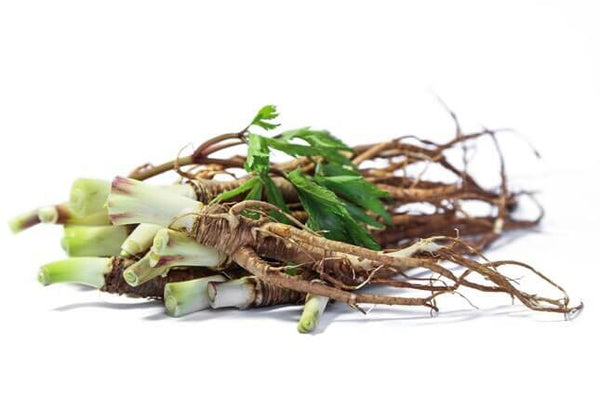Your Cart is Empty
10 Natural Supplements for Menopause Symptoms: Hot Flushes, Night Sweats, Mood Swings, Low Energy & More

Menopause can really do a number on your everyday life. Every woman goes through it but every woman has a slightly different experience. Some people experience almost no symptoms, while others experience symptoms that make everyday life quite difficult. From extremely low energy to mood swings and hot flushes and night sweats.
There is no proven, 100% effective way to prevent menopause or make symptoms like hot flashes and night sweats disappear. However, there are certain lifestyle changes that we can adopt to help manage these symptoms, like incorporating exercise into your daily routine, diet changes, and supplements to help your body be as healthy as possible.
If you are already exercising and follow a good diet, but considering taking supplements, you’re in the right place. It can be very confusing to know where to start with herbal supplements for menopause symptoms. With a market full of supplements promising menopause relief - it's hard to decide which one is the perfect one for you.
As we said, everyone is different. Some supplements might target menopause symptoms for many women, but not be as helpful for others.
We have put together a guide for what kind of natural herbal supplements are good for what - this will give you an idea of what type of ingredients you should keep an eye on when choosing the right supplements for menopausal symptoms.
This is great information for women who want to change their individual menopause experience to be more manageable and get menopause relief through a consistently healthy lifestyle and the right kind of supplementation.
1) Red Clover
Red Clover, orTrifolium platense, is called a women's plant by many herbalists - it's a well-known natural supplement for women, especially during the time of menopause. This is a plant that is fairly humble - you have probably seen it inhabiting unruly lawns and meadows.

Red clover is known to contain natural isoflavones which are naturally occurring phytoestrogen. This makes it a perfect supplement to battle menopausal symptoms because it can help to do the job that your estrogen used to do - much like soy isoflavones or the phytoestrogens found in flax, red clover will fight symptoms that are caused by lowered estrogen levels such as:
- Hot flashes and night sweats
- Bone density loss
- High cholesterol
- Reduction in triglyceride levels
- It may help to increase collagen levels
- Acts as a blood thinner, preventing blood clots
As with any menopause supplement that can affect your hormone levels, be careful about taking it simultaneously with other hormonal treatments like birth control pills, hormone therapy, and if you have any types of breast cancer.
Ask your doctor about red clover if you're taking any blood-thinning agents.
It's important to prevent any side effects that may arise when you take herbal supplements and medications that step on each other's toes. Herbal supplements aren't "just" herbal supplements - when taken regularly they are powerful and active.
2)Black Cohosh

Black Cohosh, (Actaea racemosa orCimicifuga racemosa)is a plant that's native to North America. It has been used by Native Americans to relieve the symptoms of many ailments and has become popular as an ingredient in supplements for menopause symptoms. While a lot of herbs (like the aforementioned red clover) are modest in appearance, Black Cohosh is the star of many gardens, with its comet-like white flowers and dark purple leaves.
It grows tall and beautiful, and it's hard to believe that behind such an ornamental appearance lies a powerful herb. Black Cohosh became popular in Europe in the 1950s - specifically as a menopause supplement.
What did Native Americans use Black Cohosh for? Fever, slow labor progression, menstrual problems, musculoskeletal pain - one of its common names is rheumatism weed. Black Cohosh is a great cure to menopausal symptoms and helps with:
- Hot flashes
- Helps in regulating body temperature
Black Cohosh does this without affecting hormone-sensitive tissues like breast tissue or uterine tissue, which is great news for people who have to be careful about any side effects.
3) Curry Leaf Extract

Curry leaf (Murraya koenigii)is a popular, lemon-scented spice often used in Indian cuisine. It's also a powerful herb used in traditional medicine, for its blood-sugar regulating properties, and extremely high antioxidant levels. Studies point to its protective properties against oxidative damage on many organs, including the brain. Additionally, it has shown to have anti-cancer properties. When it comes to symptoms of menopause, it does a lot to alleviate some of the more tricky ones:
- Helps to regulate blood sugar levels
- Help to maintain healthy cholesterol
- May reduce chances of heart disease
- Has shown neuroprotective properties
- May reduce inflammation
It may be a bit tough to include the curry leaf in your diet - while a regular part of Indian cuisine if you're not used to cooking with certain ingredients or cooking from scratch all the time it can become a stretch.
This is why it's easiest to ingest curry leaves as a supplement - when you don't have to worry about having access to the fresh product, or keeping on top of the food prep.
4) Moringa Leaf Extract

The Moringa tree (Moringa oleifera) has been used as medicine and a supplement since ancient times. It is native to India, but it can also be grown in South America and Africa. It's considered a sort of a wonder plant nutritionally, and it's known for its many benefits for health - it's not just a menopause supplement, it can be taken by anyone who is looking for good and effective dietary supplements.
Moringa is considered to be a miracle supplement for menopausal women because it contains:
- Vitamins A, B1, B2 B3, B-6, C, and E
- Calcium
- Potassium
- Iron
- Magnesium
- Phosphorus
- Zinc
When it comes to menopausal symptoms, moringa gives you a big helping hand:
- Reduces mood swings
- Helps with blood sugar balance
- Helps to fight chronic inflammation
- Reduces stress and promotes wellbeing
- Antioxidant properties keep your skin looking great
- Helps with weight gain control
- Helps with bone health
Moringa is a great menopause supplement because it targets so many menopausal symptoms, and it is gentle on the body. Studies show no harmful side effects when taken in 50mg doses daily.
5) Turmeric Root
Turmeric (Curcuma longa) is famous for its anti-inflammatory properties and has been used in Ayurvedic and Chinese medicines for centuries. The chemical Curcumin is responsible for its bright yellow color - it is often used for dyes, although not very lasting ones. It’s one of the main colorants in monks’ robes.

Turmeric contains:
- Calcium
- Fiber
- Potassium
- Zinc
- Curcumin
- Flavonoids
Curcumin is a phytoestrogen and it helps to alleviate menopause symptoms like:
- Hot flashes
- Poor sleep quality
- Poor gut health, weight gain prevention
- Joint pain and inflammation
- High cholesterol
Turmeric has no proven side effects even when taken in large quantities. Ayurvedic medicine has been treating menopausal symptoms like hot flashes and digestion problems with turmeric - it's considered a traditional supplement and dietary aid.
6) Kava

Kava (Piper methysticum)sounds a lot like it has something to do with coffee, but don't worry - it has the opposite effects and won't leave you feeling anxious or jittery. Kava comes from the Pacific Islands and is said to originate in Papua New Guinea. Many women experience mood swings when they go through menopause, and a large number of them may go through a severe form of anxiety, worry, and other stressful symptoms. Kava supplements help with the mental side of menopause symptoms, easing your worry making you able to relax and get some sleep.
Kava benefits:
- Short-term anxiety relief
- Promotes restful sleep
When taken in concentrated supplement form, Kava is stronger than the traditional root-tea from the Pacific Islands. The Food and Drug Administration warns that Kava supplement consumption in this form may affect the liver- consult your doctor if you have any liver problems, before taking dietary supplements containing Kava.
The traditional way of consuming it is to make tea directly from the roots of the plant after an air-drying process. In the supplement form, the herb is much more concentrated and full of active ingredients.
7) Dong Quai
Dong Quai (Angelica sinensis)is also known as the "Female Ginseng" - it has been a part of Chinese medicine practice for centuries. It has been used to treat menstrual problems, symptoms of menopause, and other female reproductive system troubles. Dong Quai has been used to "enrich the blood" and regulate digestion.

Menopause symptoms that are alleviated by Dong Quai are:
- Hot flashes
- Skin health
When it comes to the side effects of Dong Quai, it's best to consult a doctor before taking it, as it can affect other medications you might be taking for menopause symptoms. They interact with hormone replacement therapy and birth control pills.
8) Ginseng

Ginseng (Panax ginseng) is well known throughout the western world - it's a commonly used spice that's used in many Asian foods, candies, and drinks. Research has concluded that it has many beneficial uses, not only as a menopause supplement but also for fatigue, blood pressure, insulin response, mild diabetes, and fatigue, amongst many other health problems.
Some of the menopause symptoms ginseng supplements are designed to help are:
- Hot flashes, night sweats
- Lessens the risk of heart disease
- Helps to stimulate estrogen production
- Reduces poor sleep
- Increases the sense of well-being
- Helps to regulate blood pressure
- Helps with depression
- Aids weight loss
Ginseng might seem like a wonder-supplement for menopause, however, studies did not show hot flash reduction due to ginseng. Ginseng is a fairly easy plant to add to your everyday menu on top of supplements - it goes great with fish, stir-fried vegetables, anything that has garlic and soy sauce.
Don't forget that you can make a warming tea with ginger, and as well as home-made ginger ale, or ginger bugs.
9) Soy Isoflavones

Many doctors recommend an increase in ingestion of soy isoflavones by menopausal women. Where are soy isoflavones found? Soy products like edamame, tofu, soy milk, or tempeh have soy isoflavones, but soy isoflavones can also be taken in the form of a supplement.
What are isoflavones? They have substituted derivatives for isoflavonoids, they act as phytoestrogens when consumed. They can be found in other plants, especially legumes. What is their role in easing menopause symptoms? By acting as a kind of estrogen, they can have a powerful effect on the symptoms caused by hormonal imbalances. They:
- Reduce hot flash frequency
- Help reduce irritability
- Reduce symptoms of depression
- Help with joint pain after regular use
Supplements are a great way of ingesting soy-derived isoflavones without switching to soy milk or other soy products. Some side effects may include constipation and loss of appetite.
10) Probiotics

Probiotics can be found in many sources. Naturally fermented foods like yogurt, miso, kombucha, beet kvass, lactose-fermented pickles, kimchi, tempeh, and many other foods and beverages across all continents and cultures.
Fermented probiotic food has been with us for quite some time. Many people love probiotic food for their taste - but how do they help with menopause symptoms? Probiotics are a huge contributor to gut health - not many people know this, but a lot of hormone regulation happens in the gut.
Keeping your gut biome healthy and diverse helps not only with hormone regulation, but with nutrient absorption, and successful weight management, which tends to become a big problem for menopausal women, sometimes even more debilitating than hot flashes or night sweats.
Probiotic supplements can help you with:
- Better emotional eating control
- Better digestion
- Reduction in fat storage
- Better sleep quality
- Increased energy
- Hot flash reduction
Taking care of your gut health has a lot of great benefits especially when it comes to the stubborn areas of menopause-related fat storage, like your belly and your thighs. Mixed with a healthy exercise regimen, probiotics can help you become energetic and make you feel ready to tackle anything.
Side effects of taking probiotics might occur in some people, and they include a temporary increase in bloating or gas.
Final Thoughts on Natural Herbal Menopause Supplements
Finding a way to ease symptoms of menopause like hot flashes, night sweats, vaginal dryness, anxiety, weight gain, or painful joints don't have to be exclusive to using pharmaceuticals - a lot of women use natural herbal menopause supplements to target these specific symptoms.
Most of the supplements listed have been used for hundreds and not thousands of years and have been used across many cultures. Is that proof enough that they work? There have been many studies done on traditional medicines, and the knowledge of traditional and folk herbalists seems absolutely stunning - how did people who practice traditional Chinese medicine or Ayurveda know all of this?
It seems uncanny that they could gain the knowledge so exact and accurately without any scientific tools to aid them. The fact is, humans have been using plants as medicine for some say as long as 60,000 years. Throughout this time, even if a process of trial and error is used, a lot of knowledge can be gained and passed on from generation to generation. Some traditional medicine systems, like the Indian Unani medicine, have been recognized by the WHO as an alternative health care system.
As you can see, traditional medicine knows what it's doing. Women have been using it for thousands of years, and modern science has caught on if only to explain the mechanics behind their effectiveness.
As with any medicine, consult your doctor before taking any menopause supplement regularly, in order to prevent any side effects: this goes especially for side effects caused by the interaction between herbal supplements and prescription medicines and hormone replacement therapies as well as some breast cancer treatments.
